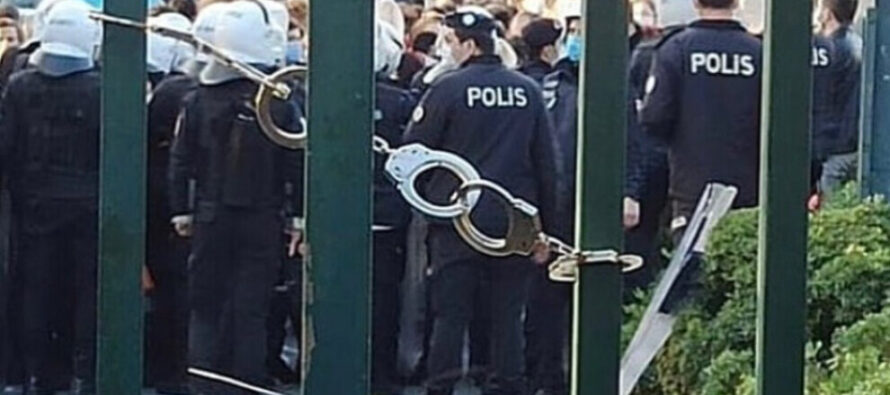Protests organised by students against the AKP trustee rector Melih Bulu who was appointed to Boğaziçi University by presidential decree have been gone on for days.
A statement of support was sent to the students by writers and journalists. Among the 147 signatories are Aslı Erdoğan, Orhan Pamuk, Ahmet Ümit, Ataol Behramoğlu, Murat Uyurkulak and Murathan Mungan. The text they wrote is titled “We will not look down”.
The statement is as follows: “We are watching with regret the unlawfulness and pressures faced by students, faculty members and university staff who exercise their constitutional democratic right of appeal against the trustee appointed to Boğaziçi University. The “look down” order given by the police to students who exercise their democratic rights clearly reveals how the government, which does not allow the nation to have its own will, want to rule the country and what it understands from citizenship. Hate speech used by the highest public authorities, the labelling of students as terrorists, unlawful detentions and police violence are new evidence that our country has long moved away from being a constitutional state of law. We see that those who have resisted for days take the burden of dead words, revive language, erase the rust of domination, and open roads full of possibilities in front of the country. As literary figures, we join this moment with enthusiasm. We stand by the resistance at Boğaziçi University. We will not bow to persecution and oppression. We will not look down.”
The signatories are as follows:
A.Ömer Türkeş, Abdullah Yılmaz, Adnan Gerger, Ahmet Telli, Ahmet Tulgar, Ahmet Ümit, Akif Kurtuluş, Alper Akçam, Alper Beşe, Altay Öktem, Anıl Mert Özsoy, Aslı Erdoğan, Aslı Ilgın Kopuz, Ataol Behramoğlu, Atilla Dorsay, Attila Aşut, Aydın Şimşek, Ayfer Tunç, Ayhan Geçgin, Ayşe Sarısayın, Ayşegül Devecioğlu, Ayşen Işık, Barbaros Altuğ, Barış Bıçakçı, Belma Fırat, Betül Dündar, Burak Acar, Burhan Sönmez, C. Hakkı Zariç, Can Dündar, Celal Çimen, Cem Erdeveciler, Ceren Cevahir Gündoğan, Ceren Olpak, Çetin Yiğenoğlu, Çiler İlhan, Cuma Boynukara, Cüneyt Ayral, Deniz Durukan, Doğuş Sarpkaya, Ece Temelkuran, Elçin Poyrazlar, Elif Durdu, Elif Şafak, Emel İrten, Emel Kayalı, Emirali Yağan, Erdoğan Kahyaoğlu, Eren Aysan, Erendiz Atasü, Eylem Ata Güleç, Fadıl Öztürk, Ferhan Şensoy, Gaye Boralıoğlu, Gökçer Tahincioğlu, Gonca Özmen, Gülce Başer, Gün Zileli, Güray Öz, Hakan Bıçakcı, Hasan Özkılıç, Hasan Öztoprak, Hatice Meryem, Haydar Ergülen, Hayri K. Yetik, Hicri İzgören, Hidayet Karakuş, Hülya Deniz Ünal, Hüseyin Bul, Hüseyin Şahin, İbrahim Baştuğ, İhsan Oktay Anar, İlhami Algör, İnci Asena, Irmak Zileli, İsa İnan, Jaklin Çelik, Kemal Gökhan Gürses, M. Mahzun Doğan, Mahir Ünsal Eriş, Mahmut Temizyürek, Mehmet Yaşın , Mehtap Ceyran, Mesut Kimsesiz, Mesut Varlık, Metin Cengiz, Müge İplikçi, Mukaddes Erdoğdu, Murat Özyaşar, Murat Uyurkulak , Murathan Mungan, Mustafa Köz, Namık Kuyumcu, Nazmi Bayrı, Necmiye Alpay, Nermin Yıldırım, Neşe Yaşın, Nesimi Aday, Nevzat Çelik, Niyazi Zorlu, Nurcan Baysal, Nurdan Arca, Olcay Özmen, Onur Orhan, Orhan Alkaya, Orhan Pamuk, Oya Baydar, Oylum Yılmaz, Ömer Faruk Ciravoğlu, Önder Kızılkaya, Öner Yağcı, Özge Doğar, Özlem Doğan Kasırga, Pınar Öğünç, Rahmi Emeç, Sedat Yurttaş, Sema Aslan, Sema Kaygusuz, Semih Çelenk, Semih Gümüş, Semrin Şahin, Seray Şahiner, Sevim Korkmaz Dinç, Sezen Ünlüönen, Sezgin Kaymaz, Sibel Oral, Şaban Ol, Şebnem İşigüzel, Taçlı Yazıcıoğlu, Tarık Günersel, Tuğrul Keskin, Tülin Dursun, Turan Parlak, Turgay Fişekçi, Ümit Kıvanç, Ünal Ersözlü, Vecdi Erbay, Yaprak Zihnioğlu, Yaşar Seyman, Yekta Kopan, Yeşim Dinçer, Yiğit Bener, Yücelay Sal, Zeynep Altıok, Zeynep Oral, Zülfü Livaneli.




 In search of the Commonwealth
In search of the Commonwealth